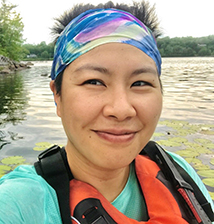Current Interns
2020
Jessica Cucinelli, Master of Marine Management candidate
WWF-Canada Research Intern: Reducing Shipping Impacts in Marine Protected Areas
Marine protected areas (MPAs) are one of the key mechanisms to provide strong protection for marine biodiversity. The federal government has signaled its continued commitment to marine protection, through the PrimeMinister’s mandate letters, which include a plan to conserve 25 per cent of Canada’s oceans by 2025, working toward 30 per cent by 2030. WWF-Canada is committed to ensuring high standards for all MPAs in Canada. Managing risks and impacts from human activities in these areas is critical, including those from fishing, shipping, and oil and gas activities. In Canada today, many MPAs do not adequately consider or mitigate impacts from commercial shipping, in part because many stakeholders and practitioners require a better understanding of the complex legal/regulatory environment that exists for commercial shipping in Canada, and in part because the body of science regarding shipping impacts on the marine environment continues to expand.
To directly address this need, WWF-Canada is working on a suite of research and practical tools to improve the management of shipping in MPAs in Canada. Spatial analysis is a key part of this initiative, including capturing best practices for working with shipping data, understanding data gaps and limitations, and applying spatial data and analysis to MPA design and management. In particular, there’s a need to better understand the available tools, best practices, and lessons learned regarding monitoring and compliance of shipping activity in MPAs and other similar spatial protection tools used globally, such as Areas To Be Avoided designated by the International Maritime Organization. Once protected areas are established with management measures regarding shipping, monitoring and enforcement of compliance by ships with these measures is critical to ensure impacts are managed as intended, as well as to facilitate adaptive management.
In support of this initiative, Jessica conducted 11 semi-structured interviews with 17 participants from government, academia, and private organizations who were deemed experts in the field of MPAs, shipping, or vessel traffic monitoring. The interviews collected information on how commercial shipping is being monitored to ensure compliance with management measures established within federally designated MPAs in Canada for example, how to determine whether vessels are complying with prohibitions on dumping, speed restriction, or spatial-temporal closures. Participants were also asked to rate how successful they felt the monitoring protocols are at ensuring compliance, noting areas for improvement. The study outlined best practices for ensuring compliance and identified potential management gaps. The result of this research was a comprehensive report that will be incorporated into a practitioner’s toolkit to reduce impacts from shipping in MPAs being developed by WWF-Canada and its partners, providing guidance for future research.
Jessica Hum, Master of Resource and Environmental Management candidate
WWF-Canada Research Intern: Using nature-based solutions in the fishing sector to address climate change
WWF-Canada is committed to using nature-based solutions to fight the climate crisis. Our oceans provide valuable ecosystem services and have a crucial role to play in drawing down and storing carbon as well as fighting biodiversity loss. We can support the capacity of our oceans to store carbon and promote healthy marine ecosystems through the protection, restoration and sustainable management of carbon rich systems such as seagrass beds and saltmarshes.
Our oceans also support a large fishing sector that is important economically, socially and culturally. There is a vast amount of marine-based knowledge and expertise held within our fishing sector, as well as a large amount of equipment used for working in the marine environment. So how can we apply the knowledge, expertise and skillset of the fishing sector to address climate change and identify ways for the fishing sector to mitigate, adapt to, and/or become resilient to the climate crisis?
In the past decade, the term "Nature-Based Solutions" (NBS) began emerging in scientific literature as well as the United Nations Framework Convention on Climate Change. Recent research has explored a spectrum of actions which include designed/engineered or managed ecosystems as well as zero-intervention approaches which address climate change. For the World Wildlife Fund, NBS are actions which intentionally work with nature to deliver measurable climate change adaptation and/or mitigation benefits and simultaneously co-benefit human development and biodiversity. WWF has developed Five Key Principles for Nature-Based Solutions which state that NBS should: result in climate ambition; result in increased climate change adaptation and/or mitigation; be informed by science; be synergistic; be co-designed with local stakeholders; and, be measurable and traceable.
Jessica’s research, in collaboration with WWF-Canada and Dalhousie University, as co-supervised by Dr. Brianne Kelly and Dr. Karen Beazley, aims to build on previous studies which have evaluated the intended benefits of NBS against the realities of implementation in practice. Jessica completed a rapid mapping literature review to inform her research hypothesis. She interviewed fifteen subject-matter experts, engaging with scientists, fishery managers, governments and eNGOs from coast to coast to coast. Through a realist analytical framework, Jessica is exploring nature-based climate solutions which are/are not working, for whom, in what contexts, and in what circumstances. Realist analysis provides the framework to identify key opportunities, challenges and priorities for potential implementation and scaling up of NBS on the ground and in the sea.
Shen Molloy: Master of Resource and Environmental Management candidate
WWF-Canada Research Intern: Reducing the impacts of single-use plastic on the marine environment

Marine debris, specifically in the form of plastic pollution, is pervasive in the marine environment. It has been found on remote islands far from any human habitation, and at the greatest depths of the ocean. Microplastics, which form when larger pieces of plastic degrade, are even making their way into the seafood we eat. From entanglement to ingestion, marine debris has created a new anthropogenic threat to our oceans and is garnering international attention. The United Nations Sustainable Development Goal 14: Life Below Water aims to, “By 2025, prevent and significantly reduce marine pollution of all kinds, in particular from land-based activities, including marine debris and nutrient pollution.” Canada is beginning to take notice of this issue, banning microbeads at the beginning of 2018, and committing to phasing out harmful single-use plastics (SUPs) by 2021, but more work is needed to stem the tide of plastic pollution entering our oceans.
WWF-Canada’s “Nature Sans Plastic” project aims to reduce the amount of plastic entering waterways through encouraging grassroots actions such as participating in the Great Canadian Shoreline Cleanup (GCSC), encouraging individuals and businesses to reduce their plastic use, and advocating for other reductions. WWF-Canada has also been working with other organizations, including Coastal Action and the Clean Foundation, to expand a number of plastic reduction initiatives, with the aim at promoting education on the importance of reducing plastic use and driving actions to reduce plastic consumption. These include the Ocean Friendly Nova Scotia (OFNS) initiative, aimed at recognizing businesses that have voluntarily reduced the number of SUPs that they offer to customers, and investigating the public perceptions of bag bans in the four Atlantic provinces
While some of Shen’s research had to be put on hold due to the Covid-19 crisis (such as conducting research for the OFNS initiative and advancing shoreline cleanups in the region), she was able to pivot her work to assist with information collection that could aid others when outreach could begin again. She created a map of GCSC locations from 2015-2019 for each Atlantic Province to help visualize where the clean-ups were happening, in order to highlight gaps in knowledge where cleanups could be targeted in the future. Shen also conducted 15 semi-structured interviews with waste managers, environmental groups, government officials, and academic researchers across Atlantic Canada to gain an in-depth perspective on SUPs from experts in the field. She also conducted a community survey to gauge public perceptions of plastic bag bans in Atlantic Canada which received over 1000 responses. All of Shen’s work was encapsulated in a final report which included an interactive map of the locations of Great Canadian Shoreline Clean-up sites across Atlantic Canada, an update on the progress of business recognition program expansions in multiple communities in Atlantic Canada, and the results from evaluating Atlantic Canada’s single-use plastic policies.


